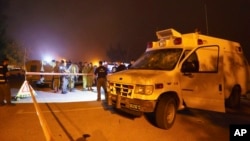Dozens of Druze residents of the Israeli-annexed Golan Heights attacked a military ambulance carrying two injured Syrians Monday night, beating one of the Syrians to death on suspicion that they were Islamic militants. The incident displays the spiraling anger inside Israel's Druze community — which has been pushing for the Israeli government to do more to help Druze Syrians caught up in that country's civil war.
Two Israeli soldiers in the ambulance were also lightly wounded, and the other injured Syrian was evacuated to an Israeli hospital in critical condition. It was the second incident in one day in which Druze villagers confronted an ambulance that they believed was transporting injured Syrian militants.
Israeli Prime Minister Benjamin Netanyahu on Tuesday harshly condemned the attack.
“We will not allow anyone to take the law into their own hands. We will not allow anyone to disrupt Israeli soldiers in their missions,” he said. “We will locate those who carried out this mob killing and bring them to justice. We are a country of law and are not a part of the anarchy that is spreading around us.”
The Druze, a religious sect that began as an offshoot of Shi’ite Islam, are among Israel's most loyal citizens and serve in its military. But they are also increasingly worried about the plight of their brethren in Syria. Earlier this month the Nusra Front, al-Qaida's branch in Syria, killed as many as 20 Druze citizens.
Druze residents of Israel have also been angered by the Israeli government's policy of extending medical aid to injured Syrian rebels, suspecting that some of those treated have been Islamic militants. The Israeli military did not identify whether the injured Syrians in the ambulance on Monday were rebel fighters or civilians, but the military has denied treating Islamic militants in the past. Israeli media on Tuesday reported that the injured Syrians were rebel fighters.
Israel's estimated 130,000 Druze live mostly in the north of the country, where some have taken to the streets, demanding more decisive action to help the Syrian Druze. Some have demanded that Israel provide weapons and air support; others have proposed that thousands of Syrian Druze be allowed to take shelter inside Israel, if necessary, or that they themselves be allowed to cross the border and fight on behalf of the Syrian Druze.
The Israeli government insists it will not allow the Druze to be massacred but has stopped short of major action.
The Druze leadership in Israel condemned the pair of attacks Monday and was convening Tuesday for an emergency meeting to address the growing anger in their community.
In Israel, the Druze have a particular tight bond with Jews that dates much farther back than helping them win independence in 1948. The Druze revere Jethro, the father-in-law of Moses, whose tomb in northern Israel is one of their most sacred sites. In recent days the community has enjoyed widespread solidarity from other Israelis, though that has partially been replaced by outrage after the violent attacks on military ambulances.




